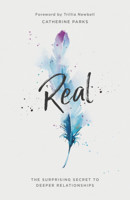
It was my first time at this church's Bible study and I was sitting with a group of strangers, listening to them talk and pray for each other, awaiting my turn, when it hit me: I didn’t have many real friendships. I had been having girls’ nights and spending time with several women for years, but there was so much they didn’t know about me. In fact, in the thirty minutes of prayer time at the end of this Bible study, I found out more about strangers (and shared more about myself with them) than I had in years of relationships with most of my friends.
It’s not like my friends and I ever ran out of things to talk about. We talked about home decorating and parenting, local restaurants and books we’d read. But rarely did those conversations go deeper.
Why do we struggle to get real and take our friendships out of the shallow end?

How being real with others about our struggles helps us to fight sin and experience the authentic friendships we crave.
Fellowship, or koinonia in the Greek, is a biblical term that implies intimate, spiritual fellowship. It’s a communal bond. This fellowship starts with God—the holy Trinity of Father, Son, and Spirit united in perfect love. Creation is an overflow of this love; it flows from God’s desire to share this fellowship with created human beings, made in the image of their Creator. This means that you and I were created with a fundamental desire for this kind of fellowship—we've been designed to enjoy a deep, spiritual relationship of love with God and with one another. It’s the kind of relationship we glimpse briefly in Genesis chapters 1 and 2 as Adam and Eve walk and talk together in the Garden of Eden with God.
Humans have desired that same kind of fellowship ever since—and while God is the only One who can truly satisfy that desire, it’s often in our human relationships that we first detect the lack. And we don’t just desire it; we actually need it. A study conducted by researchers at Brigham Young University over the course of 34 years, and involving more than 3 million participants, showed that social isolation and loneliness contributed to an average of 29% and 26% increased likelihood of mortality respectively. These statistics put the health risks of isolation and loneliness on a part with obesity. On the flipside, the existence of strong social relationships was observed to provide positive health benefits.
If we’re made for this kind of deep fellowship, why do we not have it? Why do things often feel so shallow?
Because we’re too busy hiding. As on social media, so throughout life our tendency is to cover up our true selves, rather than being honest and vulnerable about our weaknesses and failings. We present an image of having it all together and being able to do it all, while secretly feeling we might sink due to the weight of all our busyness. We’re far quicker to tell friends about a success—the promotion, our child’s milestone, a running distance—that a failure—that small dishonesty said to save face, the gossip we passed on about a co-worker, the lack of control over our anger with our children. Honesty feels too risky--what would people think of me if they knew?
But the root of the problem goes deeper. Real fellowship is a gift to us from the triune God, who made us in his image—which means that we can’t experience this true fellowship with others unless we have fellowship with him.
And the thing that gets in the way of this fellowship with God is the same thing that hinders our fellowship with others. The Bible uses a short, blunt word to describe it: sin. Here’s 1 John 1:5-2:1:
"This is the message we have heard from him and declare to you: God is light; in him there is no darkness at all. If we claim to have fellowship with him and yet walk in the darkness, we lie and do not live out the truth. But if we walk in the light, as he is in the light, we have fellowship with one another, and the blood of Jesus, his Son, purifies us from all sin. If we claim to be without sin, we deceive ourselves and the truth is not in us. If we confess our sins, he is faithful and just and will forgive us our sins and purify us from all unrighteousness. If we claim we have not sinned, we make him out to be a liar and his word is not in us. My dear children, I write this to you so that you will not sin. But if anybody does sin, we have an advocate with the Father—Jesus Christ, the Righteous One."
When it comes to our sin, John says that we can do one of two things with it before God: either confess it or cover it up.
Our natural response is to do the latter, from the Garden of Eden onwards. But when we claim to be without sin, we deceive ourselves--we fool ourselves into thinking we’re not that bad. And even worse, we make out that God is the one being deceitful: ”If we claim we have not sinned, we make [God] out to be a liar and his word is not in us” (v 9). And, we’ll never experience the joy of his forgiveness if we deny that we are sinners in need of a Savior.
When we intentionally bring our sin into the light, this act of confession creates a bond with others
But when we confess it, a few things happen. First, we’re able to be made spotlessly clean, because we have “an advocate with the Father—Jesus Christ, the Righteous One” (2:1). When we come into the light, covered in sin and shame, he has already provided what we need to be cleansed—his Son. So however guilty we feel, and however much we fear exposure, when we step into the light and confess our sins, we have this promise: “He is faithful and just and will forgive us our sins and purify us from all unrighteousness.” And John’s audience is believers—those who have already been saved from the penalty of sin. He is calling us to regular confession and repentance, born out of a love for God and a desire to not continue to sin.
But don’t miss the detail in 1:7: it’s when we’re purified from all sin that we have “fellowship with one another.” This is the surprising secret to deeper relationships: confessing our sin before God.
Why? Because the one anothers of verse 7 are in the same boat as we are—they need the blood of Jesus too. Church should not be a place where people cover their sin, but a community of forgiven sinners walking in the light together. When I’m honest with myself and with God, I’m reminded of his complete and total forgiveness, and this frees me to be vulnerable with others. After all, if you and I both know we need God’s forgiveness, and we both knew we have God’s forgiveness, what is there left to hide from each other?
When we intentionally bring our sin into the light, this act of confession creates a bond—a fellowship—with others. It’s a “same team” mindset, where we are together, fighting side by side against our sin. When we confess sin in front of friends, we show them they’re not alone. We’re all in this together, and God’s grace is sufficient to cover it all. Rather than opponents or rivals, we should view ourselves as a team, struggling side by side against our sin—and that means we must be honest with our teammates.
We can walk in the light, experiencing the joy of true fellowship with our Father and his Son, our Savior. We can enjoy the kind of linked-arms community only possible among saved sinners walking the same path. In Christ, we get the privilege of being fellow laborers and brothers and sisters.
So let’s learn to confess and battle our sin together—because true peace and deep relationships are possible through honesty about our struggles and our need for a Savior.
This is an extract from Real: The Surprising Secret to Deeper Relationships. This book shows us that the secret to growing the relationships we crave is in developing a biblical habit of repentance. By being honest about our sin before God and receiving his forgiveness, we're freed be honest about our sin with others. Buy the book today.